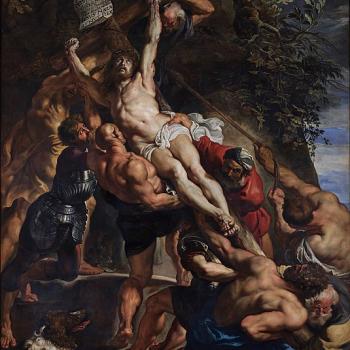Lars Walker, the novelist who is a long-time commenter on this blog, has written a perceptive review of the hit movie Thor. He liked it–as did I, actually, for the most part–but what struck me in his review is his point about how even our pop paganism has been influenced by Christianity. Lars, an expert in all things Norse, points out that the notion of a benevolent deity–taken for granted even by atheists–is distinctly Christian, and that the actual pagan gods were very, very different:
To anyone schooled in Norse mythology, the Odin of the movie is almost unrecognizable, except for his long beard, lack of one eye, and possession of Sleipnir, the eight-legged horse (which provides an extremely cool special effects moment). Anthony Hopkins’ Odin is wise and good, full of benevolence and cherishing a horror of war. He’s kind of like a professor of English or some social science at an Ivy League university—wooly-headed enough to throw away the gods’ greatest weapon at a moment of dire military threat.
The Odin of the Vikings was most of all an extremely powerful magician, a wizard—not the nice kind of wizard like Gandalf, though he was one of Tolkien’s inspirations for the character, but the old kind of wizard—treacherous and murderous, with lies on his lips and blood under his fingernails. He delighted in war for two reasons—one in order to feed the wolves and ravens that were his familiars, secondly in order to fill his hall, Valhalla, with heroes who would stand with him at Ragnarok, the last great battle. To this end he raised heroes up and then brutally betrayed them. He was also, according to the eddas, a sexual predator and a known deviate.
The difference between these two Odins, I think, is suggestive of important—and generally unrecognized—elements in western culture. The script writers have confused Odin with the Yahweh of the Jews and Christians. It doesn’t even occur to them that a high god could be anything but kind and peace-loving, since we all have so thoroughly internalized Christian suppositions that even people who reject the Christian religion—and I assume that a large proportion of the people who made this movie do—can’t conceive of a religion founded on darkness, brute force, and the domination of the weak by the strong.
In an odd plot element (I’ll try not to spoil it) Thor submits to a Christ-like humiliation for the sake of others. This is something that would have never been said of him in the old religion, except as a joke. Even Thor has grown richer through acquaintance with Jesus.
via Touchstone Magazine – Mere Comments: “Thor”: Norse Mythology Mediated By Christian Ideas.















